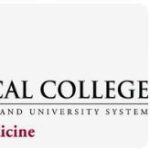The MCAT (Medical College Admission Test) is a standardized test to check the suitability for studying medicine abroad. It has been used to select prospective medical students in the United States and Canada for over 80 years. The MCAT is performed by the test provider Prometric on behalf of the Association of American Medical Colleges (AAMC), which has the majority of medical schools at US and Canadian universities.
Target group of the MCAT (Medical College Admission Test)
While you can start studying medicine in Germany right after school, it is not possible in the USA and Canada to apply to a medical school right after high school. Instead, a bachelor’s degree is required. Only then does the mostly four-year medical degree, which ends with the MD (Medical Doctor).
Many US and Canadian students choose a major in natural sciences for their bachelor’s degree or even take a pre-med program that aims to prepare them for later medical studies. Basically, however, the application to the Medical School is open to Bachelor graduates of all disciplines.
Against the background, it is understandable that the medical schools use a test like the MCAT for the selection of their applicants. It is an important criterion in order to better compare the suitability and skills of the applicants with their sometimes very different professional backgrounds. For this reason, both domestic and international applicants must take the test.
Exam contents and test structure of the MCAT
The MCAT examines the following three areas:
- Physics and chemistry (physical sciences)
- Biology (biological sciences)
- verbal reasoning
It takes about 4 hours and 5 minutes in total and consists mainly of multiple choice questions.
The physical science questions examine the problem solving skills in the general areas of these two basic disciplines. There are 70 minutes available for this.
The area of the Verbal Reasoning takes 60 minutes. The questions test reading comprehension based on given text passages. The texts can come from the humanities, social or natural sciences and do not require any special knowledge. Good basic knowledge is certainly helpful.
The biological science exam takes 70 minutes and includes questions on the basics of biology and organic chemistry.
Trial section
Until 2013 there was also another section of the exam – the Writing Sample. However, this has now been abolished. The so-called trial section has taken its place. This voluntary examination section lasts 45 minutes and is not included in the evaluation. The trial section contains questions for future trials that will be tested under realistic conditions.
MCAT rating scale
Each of the three parts of the exam is rated on a scale from 1 (low) to 15 (high). The total score consists of the sum of the three individual scores. The optional trial section is not assessed, but the test participants themselves receive feedback on their performance in this area if the tasks are dealt with seriously.
Repetition of the MCAT
It is possible to repeat the MCAT to improve the score. However, the test can only be taken up to three times within 12 months. If you have the feeling immediately after the MCAT that it did not go well, you can have the test deleted immediately. It is not evaluated at all and therefore not included in the maximum number of tests that can be performed each year.
Preparation for the MCAT (Medical College Admission Test)
A thorough and long-term preparation on the MCAT (Medical College Admission Test) is essential. Many local students start preparing for the MCAT early and in the course of their bachelor’s degree. Admission to medical schools in the United States and Canada is very competitive. The competition is therefore fierce, especially since only a small proportion of the study places at the medical schools are allocated to international applicants.
But it is not just the preparation of the content that is important. In the unfamiliar test situation, you should also know as exactly as possible what to expect. Therefore, participants should also deal with the test structure and assessment methods in advance.
The AAMC offers various learning aids to prepare for the MCAT. The subject areas that are checked in the MCAT can also be viewed free of charge on the MCAT website. On the other hand, you can also purchase the Official Guide or the Official MCAT Self-Assessment Package on the same page.
Test centers, exam dates and registration
The MCAT (Medical College Admission Test) is offered several times a year in various test centers in Germany. Unfortunately, there is currently no test center in Austria and Switzerland. A list of all test centers worldwide as well as the current examination dates are accessible via the MCAT Scheduling and Registration System. To do this, you need to register on Prometric’s official MCAT website. You can then register for the test yourself in the same way.
Registration at least four weeks in advance is recommended. The organizer AAMC divides the registration deadlines into:
- a gold zone (about four weeks in advance)
- a silver zone (about three to four weeks in advance)
- a bronze zone (about one to two weeks in advance)
The later the registration is made, the less flexibility there is in the event that the examination date has to be changed again.
When choosing the examination date, it is also important to note the application deadlines of the medical schools at which the application is to be made. It may take 30 to 35 days for the MCAT results to be available.
MCAT costs and funding options
The registration fee for the MCAT (Medical College Admission Test) for registration within the gold or silver zone is US $ 275. If the registration is only in the bronze zone, the fee is US $ 325 There is also an international fee of US $ 90. The total examination fees range from US $ 365 to US $ 415 depending on the registration date. Payment of the fees is currently only possible online by credit card.







